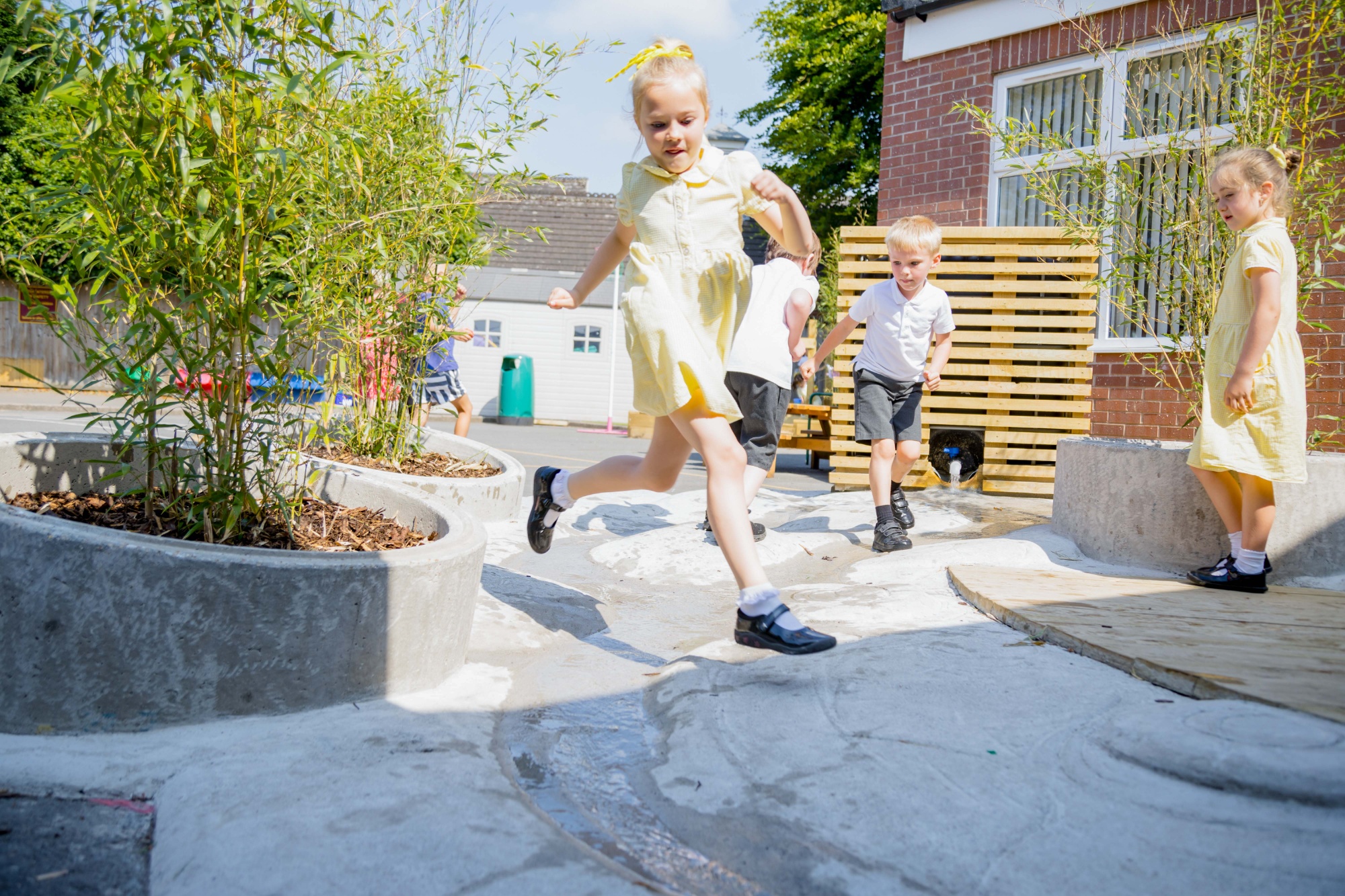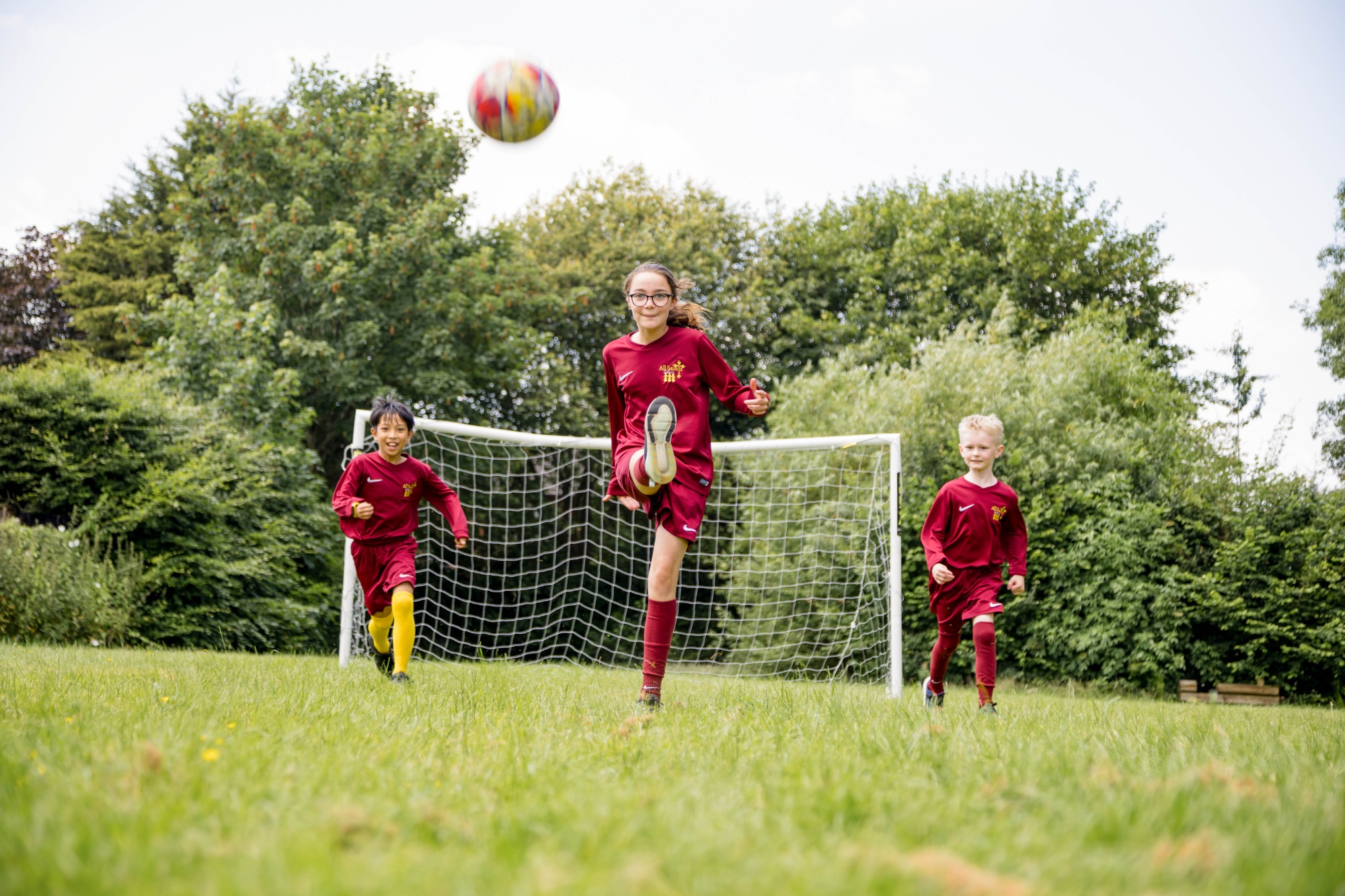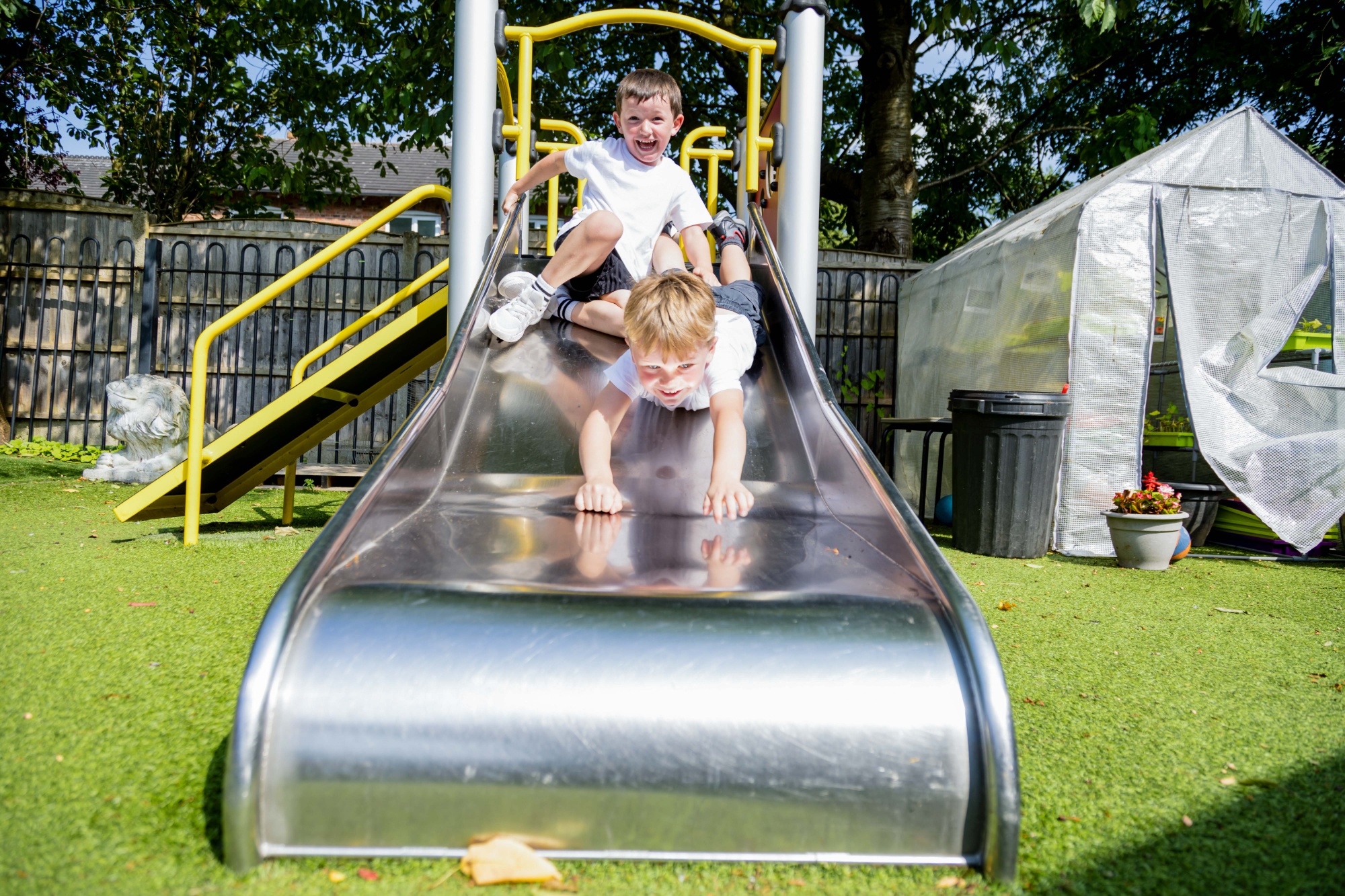P.E
Living our Faith, Learning in Love
Overview
At All Saints’ Catholic Primary School, we value Physical Education as an essential part of the holistic development of every child. We recognise the important role that P.E. plays not only in promoting physical health and fitness, but also in nurturing cognitive skills, emotional wellbeing and positive social interaction. Rooted in our Catholic ethos, our approach to P.E. supports children’s spiritual, moral and cultural development by fostering values such as respect, perseverance, teamwork and fairness.
Through a broad and balanced curriculum, we aim to inspire a lifelong love of physical activity and to help all pupils - from Nursery to Year 6 - develop increasing self-confidence and competence in managing their bodies in a range of movement situations. Our provision encourages each child to strive for their personal best while learning to collaborate and compete respectfully with others.
Curriculum Intent
Our Physical Education curriculum is designed to be broad and balanced, providing all pupils with the opportunity to master their learning and deepen their knowledge, making sense and giving purpose as to why we learn about P.E. At All Saints’ Catholic Primary School, we believe that Physical Education helps to develop the knowledge, skills and capabilities necessary for mental, emotional, social and physical well-being in our children now and for their future. Physical fitness is an important aspect of leading a healthier lifestyle. It teaches self-discipline and that success is only achieved through hard work, resilience and determination. It is our intent at All Saints’ to teach children life skills that will positively impact on their future. We want to teach children how to cooperate and collaborate with others as part of a team, understanding fairness and equity of play to embed life-long values. We aim to deliver high-quality teaching and learning opportunities that inspire all children to succeed in physical activities. The children will have access to PE in accordance with the National Curriculum 2014. It is our intention that throughout their time at All Saints’, they will achieve the following required aims:
- Develop competence to excel in a broad range of physical activities
- Are physically active for sustained periods of time
- Engage in competitive sports and activities
- Lead healthy, active lives.
Curriculum Implementation
At All Saints’ Catholic Primary School, Physical Education is delivered in line with the 2014 National Curriculum. The principles and content of the National Curriculum are embedded at the heart of our P.E. programmes of study, ensuring progression, breadth and balance across all year groups. Our provision is designed not only to promote physical development and wellbeing, but to uphold the highest standards of teaching and learning in P.E.
All pupils engage in a minimum of two hours of high-quality physical education and sporting activity per week. These sessions are taught by both class teachers and a dedicated sports coach, providing a rich and varied experience that supports skill development and physical literacy. Planning is carefully structured in the short and long term to ensure continuity and progression in both knowledge and skills across units and key stages.
From September to February, Year 4 pupils attend weekly swimming lessons to develop water confidence and swimming proficiency in line with National Curriculum expectations. Throughout each P.E. unit, pupils are given the opportunity to apply their developing skills in peer-level competition, promoting confidence, resilience, and teamwork.
At All Saints’, we recognise the importance of oracy in developing confident, articulate, and reflective learners. Within Physical Education, oracy is embedded through structured opportunities for pupils to express their ideas, explain strategies, reflect on performance, and engage in collaborative discussion. Children are encouraged to use subject-specific vocabulary to describe movements, tactics, and health-related concepts, thereby deepening their understanding and ability to communicate effectively. Paired talk, group discussions, peer feedback and teacher-led questioning are integral to every lesson, helping to build pupils’ confidence in speaking and listening. By fostering a culture of respectful dialogue and active participation, we ensure that oracy enhances both the cognitive and social aspects of learning in PE.
In response to the Department of Health’s ‘Childhood Obesity: A Plan for Action’, we are committed to ensuring that every pupil participates in at least 30 minutes of moderate to vigorous physical activity each school day. This is achieved through a combination of:
- Active learning strategies in the classroom
- Structured activities during break and lunchtime
- A wide range of extra-curricular sports clubs
- Participation in The Daily Mile at least three times each week
We also provide extensive opportunities for pupils to participate in extra-curricular activities and represent the school in inter-school sporting competitions across a range of disciplines. This inclusive approach enables all children to access enriching physical experiences, supporting both their physical development and wider wellbeing.
Our commitment to high-quality provision ensures that Physical Education at All Saints’ is not only a key driver of health and personal development, but also a subject delivered with rigour, enthusiasm, and a strong focus on excellence in teaching and learning.
Curriculum Impact
Our PE curriculum aims to improve the wellbeing and fitness of all children at All Saints’ not only through the sporting skills taught, but through the underpinning values and disciplines PE promotes. Within our lessons, children are taught about self-discipline and that to be successful they need to take ownership and responsibility of their own health and fitness. P.E is taught as a basis for lifelong learning, where the children have access to a wide range of activities in the belief that if taught well and the children are allowed to succeed, then they will continue to have a physically active life. At All Saints’, we provide opportunities for children to become physically confident in a way which supports their health and fitness. Opportunities to compete in sport and other activities build character and help to embed values such as fairness and respect. Our impact is therefore to motivate children to utilise these underpinning skills in an independent and effective way in order to live happy and healthy lives.
Assessment 
Assessment in Physical Education at All Saints’ Catholic Primary School is ongoing and integral to high-quality teaching and learning. It enables teachers to monitor pupils’ progress, identify areas for development, and ensure that every child is supported and challenged appropriately.
Formative assessment takes place continuously throughout P.E. lessons. Teachers and sports coaches assess pupils through observation, questioning, and performance in both skill-based and game-based activities. Children are encouraged to engage in self-assessment and peer-assessment, reflecting on their own performance and offering constructive feedback to others. This helps to develop a deeper understanding of physical skills, tactics, and healthy lifestyles.
Each unit of work includes clear learning objectives and success criteria aligned with our progression map. Teachers use these to make judgements about:
- Physical competence and skill development
- Knowledge and understanding of tactics, rules, and healthy living
- Personal and social skills including teamwork, resilience, and leadership
Progress is recorded using school-wide tracking system to ensure consistency and support transition between year groups. Assessment information is used to:
- Inform future planning and lesson adaptation
- Report to parents through termly or annual progress reports
- Celebrate achievement in assemblies, school newsletters, and displays
By the end of Key Stage 2, pupils are also assessed against national expectations in swimming and water safety. We record whether each child can swim 25 metres confidently, use a range of strokes, and perform safe self-rescue.
Ultimately, assessment in P.E. is designed to support every child in becoming physically literate, confident, and active, in line with our whole-school commitment to inclusive, high-quality education.
Early Years
In line with the Development Matters guidance, Physical Education in EYFS is a vital part of the curriculum and is delivered in line with the Early Years Statutory Framework and the Physical Development area of learning.
We recognise that physical development in the early years is key to children’s overall health, wellbeing, and readiness for learning. Our provision is carefully planned to support both gross motor and fine motor development, and lays the foundation for confident movement, spatial awareness, coordination, and control.
Children in EYFS are provided with opportunities for physical activity through:
- Structured P.E. sessions, led by the class teacher or sports coach, which develop core skills such as running, jumping, balancing, throwing, and catching.
- Continuous provision in the indoor and outdoor learning environments, where they explore movement and active play freely and creatively.
- Opportunities to develop fine motor skills through activities such as threading, mark-making, construction, and using tools with control.
The focus in EYFS is on exploration, enjoyment, and building positive attitudes towards being active. Physical activity is embedded across the curriculum and supports the development of confidence, resilience, cooperation, and turn-taking.
Staff observe and assess children’s physical development against the Early Learning Goals (ELGs), with progress tracked in line with school policy. Assessment informs planning to ensure all pupils are supported and appropriately challenged in their physical development.
Our aim is to foster a lifelong love of movement and physical activity from the earliest stages, preparing children for the transition into Key Stage 1 P.E. with confidence and enthusiasm.
Health and Safety
Large PE equipment is checked annually. If any defect is found in any of the equipment or PE areas this must be reported immediately to the site manager and taken out of use. If any training needs arise e.g.; manual handling, this will be arranged.
It is the responsibility of the teacher to take note of any medical conditions of individual children in their class so they can participate safely and as fully as possible. It should be noted that cold, dry weather can exacerbate breathing problems for asthmatics and they should have their inhalers to hand if necessary.

Jewellery
All items of jewellery should be removed for all P.E lessons. Children who have had their ears recently pierced are able to wear studs. Teachers must not remove earrings or take responsibility for the safe keeping of valuables. Long hair should be tied back at all times, where a child comes without a bobble, they will be given one by a member of staff.
Resources
- The site manager will inspect the outdoor area each morning for hazards.
- The teacher is responsible for ensuring apparatus is correctly erected and safe. Children should not move equipment without supervision.
- The teacher should ensure that there are no hazards in the hall during PE.
- Children must not be responsible for the P.E equipment cupboard and must not enter the cupboard unsupervised
SEND/Adaptions
All children have access to and are given confidence in the six activity areas, regardless of race, gender and ability. We aim to create an environment in which all children larn to respect and value each other and each other’s interests. This can be achieved by employing the following strategies:
- Mixing ability groups in terms of gender and ability.
- Structure activities so that all are fully involved. For example, a team cannot score in a game until all the team has touched the ball.
- Give all children a chance to share their work. For example, allowing time at the end of a gymnastics or dance lesson for the whole class to share their work.
- Considering the needs of children with physical or learning difficulties and taking the necessary steps, by enlisting extra help, adapting equipment or differentiating tasks, to ensure they have equal access to the curriculum.
- Considering ways in which to support ESL children. For example, simplifying language, using other children to translate, or demonstrating rather than speaking.
- Recognising the need to extend more able pupils and providing enrichment tasks to further their skills.
- Children not participating in lesson activities, will be given a task to complete based on the lesson delivered/or used to collate multimedia evidence.

Classroom Management
Children should be encouraged to work quietly to ensure total concentration and control during apparatus and physical activities.
Accident reporting
Any accidents should be reported to the first aid co-ordinator in school and to the Head teacher and it must be recorded in the accident book.
Extra-Curricular Activities
Our extra-curricular programme complements and supplements the range of activities covered in curriculum time. We participate in a range of inter-school fixtures, tournaments and festivals within the Trafford School Games Partnership. At the beginning of each term, we publish a documented timetable of clubs. The extra-curricular content aims to be varied – including competitive and non-competitive and team- and individual based clubs appropriate for all pupils.
PE Kit
For indoor PE, children are expected to participate in bare feet, and wear a plain, white T shirt and shorts only. For outdoor PE in winter, the children may wear warmer clothing, should it be necessary, at the discretion of the teacher. This comprises of: a plain, white t-shirt, dark coloured tracksuit bottoms or leggings – no branded names. Children may wear either the school P.E. hoodie or their school jumper. All children will come to school in their PE kit on the days they have PE.
Where is God in our P.E.?
At All Saints’ Catholic Primary School, we recognise that Physical Education provides rich opportunities to encounter God through the gifts of our bodies, the joy of movement and the values we live out through sport. We believe that every child is created in the image and likeness of God, with unique talents and abilities to be nurtured and celebrated. Through teamwork, perseverance, fair play and respect for others, children experience Gospel values in action. P.E. teaches us to care for our physical wellbeing - God’s gift to us - and to grow in virtues such as humility in victory, grace in defeat, and compassion towards others. Whether working independently or collaboratively, pupils are encouraged to see Christ in others, strive for their personal best, and give thanks for the ability to move, learn and grow in God’s love.
